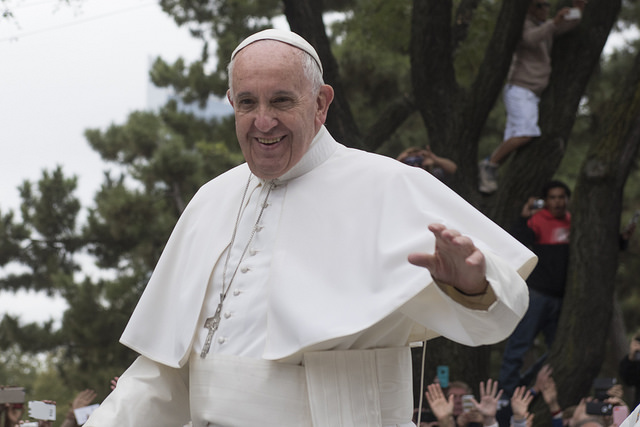By Christopher M. Reilly
It seems that American conventional wisdom has anointed Pope Francis a political progressive.
It also seems that American conventional wisdom enjoys no real understanding of what a progressive is. Start applying the term to the papacy and our language turns to mush.
Intellectually mushy political discourse causes needless quarrels in both Church politics and the convoluted American political scene. Pro-lifers should be especially concerned over sloppy use of the term progressive, for misunderstanding progressivism will lead the pro-life cause on a thorny and wayward path.
Without getting too far into political philosophy or history, here are four points regarding progressivism and Pope Francis that are crucial to understand:
1) Progressivism is a political movement and ideology that has a real American history and real consequences. In the early twentieth century, it was a middle-class political and social movement that, for all of its sincerity in defending the family and minimizing the potential for violent class and racial conflict, nevertheless produced a society that was in love with eugenics. F. Scott Fitzgerald, celebrated author of The Great Gatsby, even wrote a song entitled “Love for Eugenics.”
Eugenics was—and still is—the attempt to influence the future of humanity by controlling reproduction, with preference for certain genetic traits. Progressive eugenicists were responsible for racist and false scientific theories that helped to spawn the German Nazi regime and its killing of millions. Closer to home, up until the 1970s, over 60,000 Americans were forced into surgeries—usually sanctioned by government authorities—that removed their reproductive capabilities.
2) While progressives pander to the populace with lip service favoring human rights, progressivism is fundamentally opposed to the natural law and to Christian theology that provide the logical basis for human rights. Twentieth century progressives attacked the human individual as the bearer of sacred rights, just as 21st century progressives seek to undermine the family in our society.
3) When Pope Francis takes a stand on global warming and poverty, he may be joining American liberals on their favorite issues in more vocal ways than our recent popes, but he is no champion of the utopian, technical, and ultimately prideful eugenics of the progressives who happen to be politically allied with liberals in the United States. Progress in drawing our souls nearer to God and our neighbor, not in replacing God’s law by culling certain populations and manipulating the genetic basis of life itself, is what Pope Francis’ message seems to be about.
4) Our American public is already confused between progressive and liberal political philosophies. We don’t need to add to the confusion by applying labels to our beloved Pope Francis that have little to do with Church doctrine. To make matters worse, American progressives are ushering in a new era of eugenics, from Secretary of State Clinton’s obsession with abortion and population control to the nearly unknown advancements in biological science that are rapidly making it possible to manipulate not only the genetic code of an individual, but also the variations and genetic strains present in future generations of the human population.
Pope Francis is no progressive, at least not in the American historic sense. Nor is he a secular politician aligned according to our American and European political divides. His Holiness does, and should, say what the Holy Spirit brings forth within him without undue attention to the party line of any political division we are accustomed to. At the same time, because Americans are facing a political culture that favors a pro-death ideology, pro-lifers have wanted to hear more from Pope Francis that takes the progressives to task for their pro-abortion, pro-euthanasia, anti-population, anti-marriage, and anti-family policies.
Herein lies an opportunity: It will be much easier for our pope and Church to speak out with clarity against a pro-death, progressive ideology if we refuse to carelessly identify the pope and Church leaders as progressives.
Christopher M. Reilly is director of external relations at ALL. He holds a master’s degree in public and international affairs and has done graduate work in bioethics, public policy, and marketing. His book Deadly Progressivism: The Rebirth of Eugenics in the 21st Century will be available in November.
